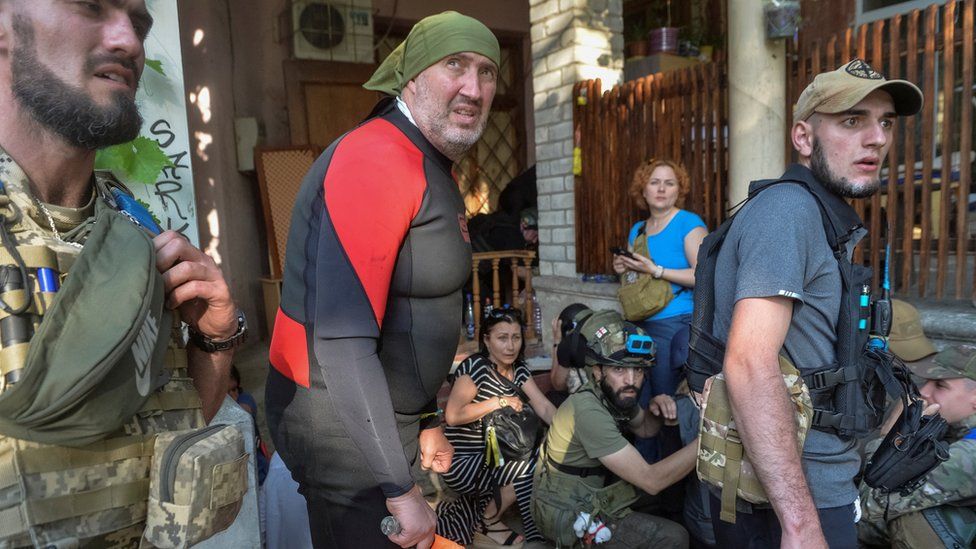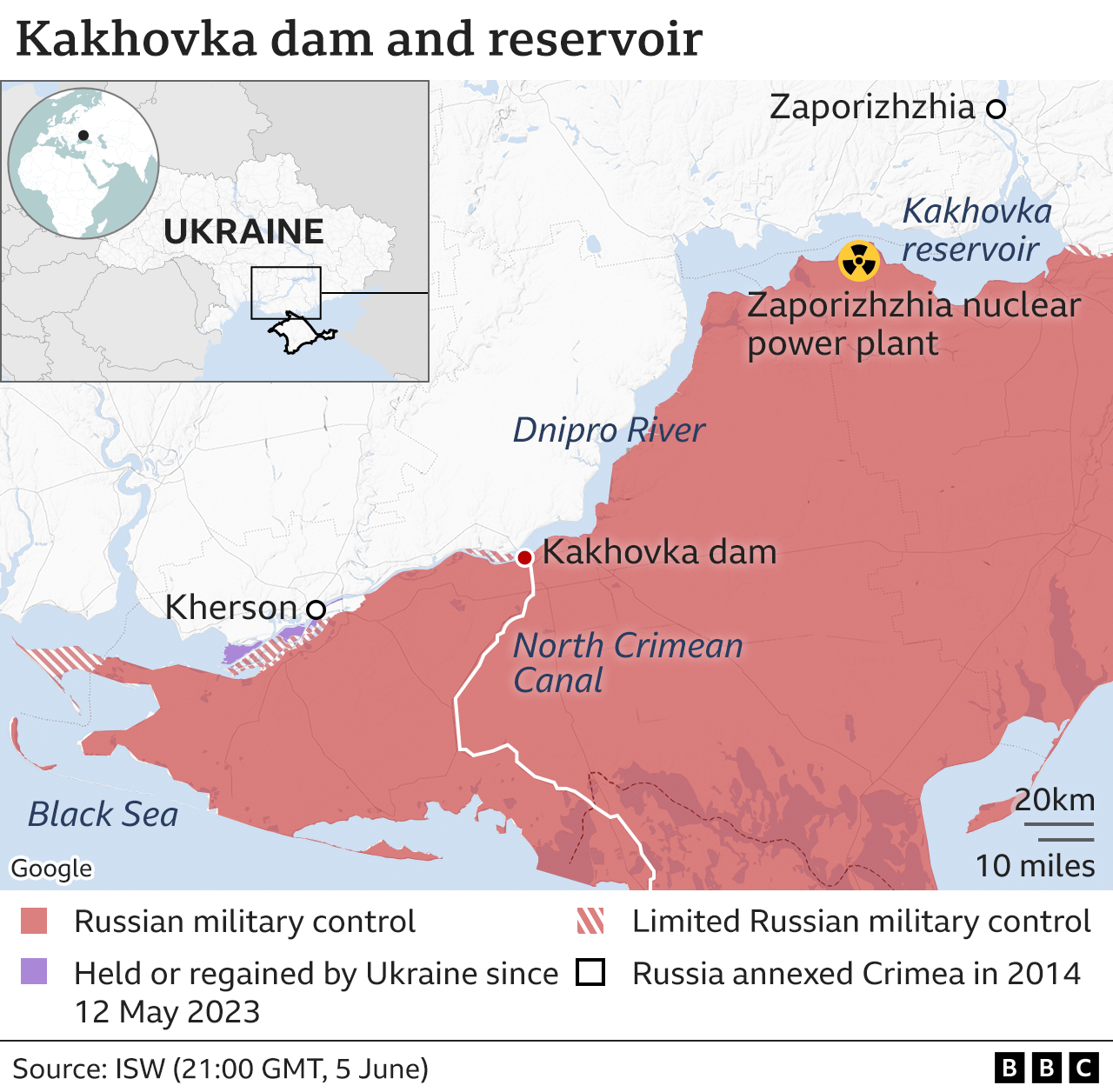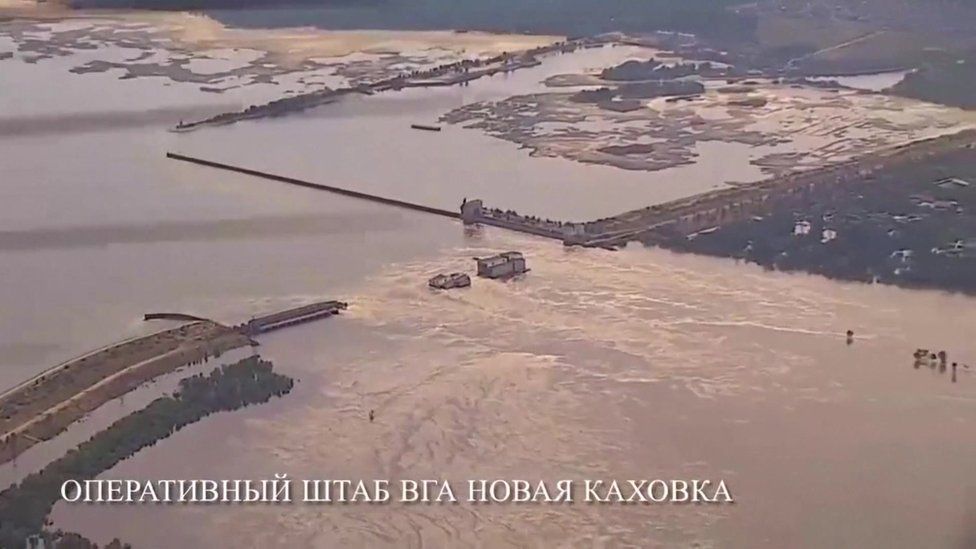Hundreds of people have been trapped on the Russia-held eastern bank of the Dnipro River.
 Image source, Reuters
Image source, ReutersThree people were killed after Russia attacked a boat carrying evacuees from a flooded area in Kherson, the regional governor said.
Ukraine has been trying to rescue people trapped on the Russia-held eastern bank of the Dnipro River since the Nova Kakhovka dam was destroyed.
Oleksandr Prokudin said Russian troops shelled the evacuation boat and shot a 74-year-old man dead.
The man was trying to rescue a woman from gunfire, Mr Produkin said.
Two police officers were also injured.
The Nova Kakhovka dam burst on Tuesday, releasing a huge torrent of water which quickly flooded vast areas of land on both sides of the Dnipro river.
Ukraine has blamed Russia for “blowing up” the dam, located in a Russian-controlled area of Ukraine. Russia has denied this and has accused Ukraine of being responsible for its destruction.
The BBC has not verified either claim, although it appears likely that Russian forces, who controlled the dam, decided to blow it up in order to complicate Ukraine’s ongoing counteroffensive.
The eastern bank of the Dnipro River has been one of the areas worst hit by the flooding, with hundreds of people there posting on the Telegram app asking to be rescued.
Ukraine’s military says it has been co-ordinating rescues from the eastern bank, but claimed “fearless volunteers” were carrying out some of the evacuations.
One of those involved in the rescue effort, Viktor, told the BBC he came under Russian fire while attempting a trip, saying Russian soldiers were “waiting for volunteers or soldiers to arrive so they can shoot them”.
The BBC has not been able to independently verify these claims.
Size of flood recedes
Meanwhile, the size of the flooded area in Kherson region has receded, officials said, but experts and officials fear infectious diseases may spread in polluted waters.
Thousands of Ukrainian homes remain flooded, and tens of thousands of people have lost access to drinking water.
Behind the dam, the huge Kakhovka reservoir – a vital source of water for the region – has drained of water.
The World Health Organization (WHO)’s Ukraine representative, Dr Jarno Habicht, told the BBC the situation was “devastating” and providing safe, clean water was a priority. He said it was important to keep an eye on water-borne illnesses and that precautionary sample testing was ongoing.
The UK’s defence ministry said people were facing a “sanitation crisis” with limited access to safe water and an increased risk of water-borne diseases.
While Ukrainian officials said no cases of infectious illnesses have been reported so far, the city of Kherson – around 100km (62 miles) from the Kakhovka dam and badly affected by the floods – has introduced restrictions on the use of river water in order to prevent their spread.
The flooding of houses and sewage facilities means the water is now highly polluted, the city military administration said, meaning that bathing, fishing and drinking the water, or giving it to animals, is prohibited.
Ukraine’s interior ministry said 32 settlements had been flooded in Ukrainian-controlled Kherson, while another 14 were flooded in the Russian-controlled part. Another 31 settlements were flooded in the Mykolayiv region.

The destruction of the Kakhovka dam has also likely led to the disruption of water supplies to Crimea, which was illegally annexed by Russia in 2014.
The North Crimean Canal draws its water supply from the Kakhovka reservoir, located behind the now-destroyed dam.
Ukrainian hydro energy company Ukrhydroenergo said the water level in the reservoir had fallen by more than 7m (23ft) and on Sunday the UK defence ministry warned that “water will soon stop flowing” to the peninsula.
Drone footage filmed after the dam breach appears to show significantly reduced water levels near the entrance to the canal.

Image source, EVN
Whoever was responsible for the destruction of the Kakhovka dam will have done so knowing that it would deprive Crimea of badly needed fresh water.
The canal was blocked by Ukraine following the annexation of Crimea in 2014, but Russia quickly unblocked it after it invaded southern Ukraine last year.
Russian commanders may have concluded that rendering the waterway useless again by blowing up the dam might have seemed like a necessary, if extreme, price to pay for complicating Ukraine’s military plans.
Earlier, Ukrainian President Volodymr Zelensky confirmed that his country’s long-awaited counter-offensive against Russia had started.
“Counter-offensive and defensive actions are taking place,” he said on Saturday.
Ukrainian troops are reported to have advanced in the east near Bakhmut and in the south near Zaporizhzhia, and have carried out long-range strikes on Russian targets.
Assessing the reality of the situation on the front lines is difficult. The respected US-based think tank, Institute for the Study of War, says that while Ukrainian forces appear to have made some localised gains, they have struggled to break through dug-in Russian positions.
On Sunday, Kyiv announced its ground forces had liberated the village of Blahodatne in the southern Donetsk region, east of Zaporizhzhia, and captured several Russian and pro-Russian troops.
It is thought to be the first settlement Ukraine has taken since acknowledging its counter-offensive has begun – but not the first taken since Monday, when pockets of Ukrainian forces began to advance in the country’s south.
Meanwhile in Russia’s Belgorod region, bordering Ukraine, rail traffic was suspended after a freight train derailed on Saturday night.
Belgorod’s border areas have been hit by drones, shelling and cross-border raids in the past weeks.
Further north, the governor of the Kaluga region, Vladislav Shapsha, said there had been two drone crashes – one near the village of Strelkovk and the other in a forest.
The BBC has not independently verified the incidents.
Additional reporting by Paul Adams.
This video can not be played